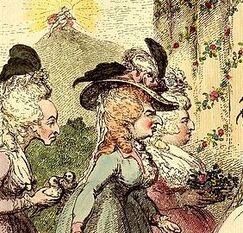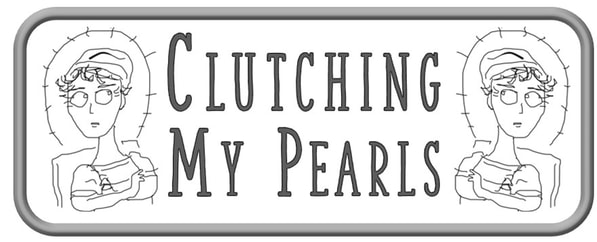 Unattractive caricatures
Unattractive caricatures While slavery does not play a role in the plot of The Bristol Heiress, two other families derive their wealth directly or indirectly from the slave trade, and another character gets a fortune from a rich relative in the East Indies. (For more about colonial wealth as a plot device, see this post.)
I outline the plot of The Bristol Heiress here. I discuss the similarities to Northanger Abbey here. It's main theme is the moral pitfalls arising out of faulty education. But because the references to slavery in the book are both so jarring and so telling, I saved this topic to discuss separately.
If you'd like to read a fictional conversation about slavery published in 1809 which represents different points of view, including the point of view of a plantation-owner, read on. If you think it would distress you more than inform you, please don't read it. I have left out the worst of the worst.
- Mrs. Trevallian, the wife of a wealthy West Indian planter who has recently returned to England “with all that showy magnificence usually displayed by those who, having suddenly become rich, are anxious to impress others;”
- Mrs. Wilkinson, a Bristol fabric merchant's wife, who is “ignorant, ill bred… [and] possessed of an intolerable share of confidence and self-conceit;”
- Lady Harcourt, a proud London aristocrat who is heavily in debt;
- Caroline Percival, the beautiful young heroine of the book. Her father is the host of the dinner party and he's still at the dining-table with the gentlemen. Caroline is the youngest person in the conversation and she is under Lady Harcourt's sway and tutelage; and
- an unnamed lady.
 Old Maiden Lady
Old Maiden Lady Lady Harcourt, though very irritated, says nothing because a "description of her own house and establishment, splendid as it was, would appear insignificant, after that of Mrs. Trevallian.... A mortified silence, therefore, succeeded on the part of Lady Harcourt, which was interrupted… by Mrs. Wilkinson’s demanding of Mrs. Trevallian, whether she could abide to be waited upon by those blacks she had mentioned?”
“'Frightful creatures!' [says Mrs. Wilkinson] ''I would rather die than take any thing from their hands, for I am sure they are not the same flesh and blood as we are.'”
“'Dear Mrs. Wilkinson,' cried a stiff maiden-lady of about five-and-fifty, who was known to be a great reader, and who, though she had never before spoke, had paid great attention to Mrs. Trevallian’s relation, 'I wonder you can talk so; you forget, it seems, that they are all God’s creatures as well as we are, and that they are only distinguished from us by a difference of colour.'”
Mrs. Wilkinson and Mrs. Trevallian both deny the equality of black people, and Mrs. Trevallian adds, "'I am much surprised our legislators should be absurd enough to suppose them otherwise,'” a reference to the on-going Parliamentary debates around the abolition of slavery. (This book was published two years after the abolition of the slave trade, but not the abolition of slavery in British territories.)
“'But you will allow, Madam,' said Caroline, who had felt a sensation little short of horror, on hearing Mrs. Trevallian express herself in a manner so unfeeling towards these unfortunates of the human race, 'that their treatment has been sometimes very cruel…”
The plantation-owner’s wife protests that reports of the harsh treatment have been exaggerated and furthermore, harsh treatment is necessary. She refers to enslaved persons as "poor wretches" but adds "'severity is the only discipline that can be used with effect'" because without the use of force, "'whence must we procure our sugars, and a thousand other necessaries? Where all our comforts, all our luxuries?'”
“'Where indeed?'” echoes Mrs. Wilkinson, declaring she wouldn’t give up sugar “'for all the black-a-moors in the kingdom.'”
"The old maiden-lady, who had first undertaken to defend the cause of humanity, darted a look of severe contempt at Mrs. Wilkinson, and then, addressing herself to a lady who sat next her, she entered with her into a discussion on the merits of a new novel, which continued till coffee was brought in, when the entrance of the gentlemen, and the arrangement of card-tables, led to other subjects of discourse."
These other subjects of discourse include playing cards for high stakes, and the affectation of learning Italian.
 Servant in livery
Servant in livery Mrs. Trevallian complains again about the insolence and independent spirit of English servants. “'a dismissal from our service is the only punishment we can inflict. How different is the situation of those menials who are doomed to attend us abroad! A woman may there be said to reign with an absolute dominion… her power is uncontrolled, her will her only law.'"
Lady Harcourt snaps back that she "‘had rather enjoy a limited, yet secure government in my own country, over free men, than an arbitrary, yet dangerous one, in the West Indies, over a wretched parcel of negro slaves.'” (By "government," she means her own authority over her servants and by "dangerous," she is referring to the possibility of a slave uprising.)
Caroline's father cheerfully supposes that Caroline will have at least one black servant to attend her after she makes a good marriage, in addition to "half a dozen European ones, with gold-laced liveries."
The two characters who speak in defense of enslaved persons are Caroline and the "old maiden-lady." Caroline is a young person still making her way in society and she is shown as being tender-hearted and appalled by what she is hearing. But what about the "stiff maiden lady" who "had undertaken to defend the cause of humanity?" In my opinion, the character of the "stiff maiden lady" is not a particularly flattering one. Why does Sleath specify that she is "stiff" and "old" and unmarried? She is "known to be a great reader." Perhaps this is a suggestion that she parrots her ideas from books.
Sleath does not even bother to give her a name, and she does not appear anywhere else in the five volumes of The Bristol Heiress. Perhaps she, too, represents a stock character, the Abolitionist do-gooder who is as much a object of satire as the planter's wife. I get the feeling that this is a portrait that Sleath's contemporary readers were expected to recognize.
I also think this conversation could be usefully compared to the brief exchange between Jane Fairfax and Mrs. Elton, the Bristol merchant's daughter, in Emma. I think the character of Mrs. Elton is derived from the stock character of the vulgar Bristol merchant's wife who appears in this and other novels. Mrs. Elton is also "possessed of an intolerable share of confidence and self-conceit."
I have found only one reference to The Bristol Heiress in the current academic literature, and it is a reference to the use of the word 'verandah.' I think an examination of this conversation, by these characters, would be useful.
Previous post: Austen and the Test of Time Next post: A novel filled with gossip -- written by a man.
| For another example of a vulgar Bristol merchant's wife, see Mrs. Ludford in Charlotte Smith's Ethelinde. Click here for the introductory post in my "Clutching My Pearls" series. For more about Mansfield Park, click on "Mansfield Park" in the menu to the upper right. For more about obscure female writers such as Eleanor Sleath, click on "Authoresses." The campaign to boycott sugar was called the Anti-Saccharite campaign. I reference it in my novel, A Contrary Wind. One of my characters, the widow of a Bristol ship-builder, refuses to serve sugar at her tea table. Click here for more about my books. |

 RSS Feed
RSS Feed